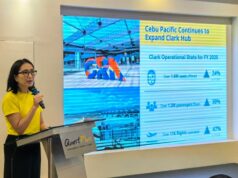CLARK FREEPORT—The Terminal 2 project, which seeks to serve three to four million passengers at the Diosdado Macapagal International Airport (DMIA) here, will not be completed in 2009, Presidential Management Staff chief Hermogenes Esperon Jr. said.
“The Clark terminal will not be finished,” Esperon said when interviewed before the birthday Mass for President Macapagal-Arroyo in Lubao, Pampanga on Sunday.
The rest of the projects—P40 billion in public works, P6 billion in farm-to-market roads and P20 billion in irrigation facilities—are set for completion in December 2009, Esperon said when sought for updates on the SONA (State of the Nation Address) commitments of the President.
He cited “time element” for the delay in the completion of the Terminal 2 project.
Two officials of the Clark International Airport Corp. (CIAC), the state agency that oversees the development of the DMIA, confirmed the report of Esperon.
“Yes, not this year but the mode of selection [of builder-operator] via joint venture [public-private sector partnership] is going strong,” said Victor Jose Luciano, CIAC president and chief executive officer.
Luciano said the Joint Venture Selection Committee (JVSC) is “doing the eligibility check on one proponent that would lead to final negotiation.”
If that is done, the CIAC board will submit the proponent to a 30-day public competitive challenge.
“Formidable challengers are waiting,” he said.
“Though we don’t finish this year, we certainly will have a Terminal 2 in 2010,” Luciano said.
Of six private firms that offered unsolicited proposals, the Pacific Avia Group Inc. (PAGI) has qualified for detailed evaluation and eligibility check to build and operate the new terminal, said Romeo Dyoco Jr., CIAC vice president for administration and finance. Dyoco also chairs the JVSC.
He said PAGI qualified for the second stage of the competitive challenge as it met the minimum requirements.
The PAGI is led by the French firm Egis, having Italian Selex and Australian Leighton as partners and contractors, he said.
The proposals of the Philco Aero Consortium, R – II Holdings, Inc., SNC – Lavalin International, Inc., Eugenio Group and Al Mal of the Al Karafi Group had been rejected.
The competitive challenge process has been cleared and consulted with the Office of the Government Corporate Counsel, he said.
The Metro Pacific Investment Group (MPIC), chaired by Manuel V. Pangilinan, has not given written or verbal proposal on the project, Dyoco said.
Pangilinan had confirmed to this reporter that MPIC was in the process of checking the feasibility of doing Terminal 2.
Dyoco said the MPIC and the five other firms whose proposals had been rejected can still participate in the third stage of the competitive challenge.
“Anybody with show money and eligibility can challenge,” Dyoco said.
“If PAGI passes stage 2, as evidenced by a mutually signed certificate of agreement and eligibility pass, its proposal will be subjected to a competitive challenge of stage 3. There will be a publication of the competitive challenge procedures,” he explained.
According to him, the project will be awarded to the best proposal in accordance with the processes and details of JV guidelines.
The DMIA was rebuilt by the Philippine government from out of the aviation complex of the United States’ Air Force when the latter pulled out of the former Clark Air Base in 1991 following the Philippine Senate’s rejection of the extension of the 1947 RP-US Military Bases Agreement.
The 2,500-hectare airport, which is fitted with two 3-km runways, is the base of the cargo forwarder UPS, Asiana Airlines, Cebu Pacific and several international carriers offering budget flights.
Among the President’s SONA promises is the so-called synergy of Clark and Subic, a former American naval base, as an international logistics hub.
“The Clark terminal will not be finished,” Esperon said when interviewed before the birthday Mass for President Macapagal-Arroyo in Lubao, Pampanga on Sunday.
The rest of the projects—P40 billion in public works, P6 billion in farm-to-market roads and P20 billion in irrigation facilities—are set for completion in December 2009, Esperon said when sought for updates on the SONA (State of the Nation Address) commitments of the President.
He cited “time element” for the delay in the completion of the Terminal 2 project.
Two officials of the Clark International Airport Corp. (CIAC), the state agency that oversees the development of the DMIA, confirmed the report of Esperon.
“Yes, not this year but the mode of selection [of builder-operator] via joint venture [public-private sector partnership] is going strong,” said Victor Jose Luciano, CIAC president and chief executive officer.
Luciano said the Joint Venture Selection Committee (JVSC) is “doing the eligibility check on one proponent that would lead to final negotiation.”
If that is done, the CIAC board will submit the proponent to a 30-day public competitive challenge.
“Formidable challengers are waiting,” he said.
“Though we don’t finish this year, we certainly will have a Terminal 2 in 2010,” Luciano said.
Of six private firms that offered unsolicited proposals, the Pacific Avia Group Inc. (PAGI) has qualified for detailed evaluation and eligibility check to build and operate the new terminal, said Romeo Dyoco Jr., CIAC vice president for administration and finance. Dyoco also chairs the JVSC.
He said PAGI qualified for the second stage of the competitive challenge as it met the minimum requirements.
The PAGI is led by the French firm Egis, having Italian Selex and Australian Leighton as partners and contractors, he said.
The proposals of the Philco Aero Consortium, R – II Holdings, Inc., SNC – Lavalin International, Inc., Eugenio Group and Al Mal of the Al Karafi Group had been rejected.
The competitive challenge process has been cleared and consulted with the Office of the Government Corporate Counsel, he said.
The Metro Pacific Investment Group (MPIC), chaired by Manuel V. Pangilinan, has not given written or verbal proposal on the project, Dyoco said.
Pangilinan had confirmed to this reporter that MPIC was in the process of checking the feasibility of doing Terminal 2.
Dyoco said the MPIC and the five other firms whose proposals had been rejected can still participate in the third stage of the competitive challenge.
“Anybody with show money and eligibility can challenge,” Dyoco said.
“If PAGI passes stage 2, as evidenced by a mutually signed certificate of agreement and eligibility pass, its proposal will be subjected to a competitive challenge of stage 3. There will be a publication of the competitive challenge procedures,” he explained.
According to him, the project will be awarded to the best proposal in accordance with the processes and details of JV guidelines.
The DMIA was rebuilt by the Philippine government from out of the aviation complex of the United States’ Air Force when the latter pulled out of the former Clark Air Base in 1991 following the Philippine Senate’s rejection of the extension of the 1947 RP-US Military Bases Agreement.
The 2,500-hectare airport, which is fitted with two 3-km runways, is the base of the cargo forwarder UPS, Asiana Airlines, Cebu Pacific and several international carriers offering budget flights.
Among the President’s SONA promises is the so-called synergy of Clark and Subic, a former American naval base, as an international logistics hub.




